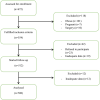The association between inflammatory and immune system biomarkers and the dietary inflammatory index in patients with COVID-19
- PMID: 37063325
- PMCID: PMC10103612
- DOI: 10.3389/fnut.2023.1075061
The association between inflammatory and immune system biomarkers and the dietary inflammatory index in patients with COVID-19
Abstract
Background: Inflammation and cytokine storm have been reported to be the main cause of acute symptoms of coronavirus disease (COVID-19). Diet-induced inflammation may affect the condition of patients with COVID-19. Therefore, this study aimed to investigate the relationship between disease severity, inflammatory and immune system biomarkers, and the dietary inflammatory index (DII) in patients with COVID-19.
Methods: This cross-sectional study was conducted on 500 adult patients with COVID-19. Patients were divided into mild, moderate, and severe conditions based on clinical and laboratory evidence. A validated food frequency questionnaire (FFQ) was used to determine DII and energy-adjusted DII (E-DII) scores. The serum C-reactive protein (CRP) level and blood cell count were measured for all patients. Multiple linear regression was used to explore the association between DII and E-DII and CRP, blood cell counts, and hospitalization in patients with COVID-19.
Results: Coronavirus disease (COVID-19) patients with higher DII had higher consumption of fat and carbohydrate and lower intakes of protein, anti-inflammatory nutrients, garlic, caffeine, tea, onion, and fiber (P < 0.05). There was a positive association between DII and CRP (β = 1.024, P < 0.001), hospitalization (β = 1.062, P < 0.001), WBC count (β = 0.486, P < 0.009), neutrophil count (β = 0.565, P < 0.001), and neutrophil-to-lymphocyte ratio (β = 0.538, P < 0.001) and a negative association between DII and the lymphocyte count (β = -0.569, P < 0.001). There was a positive association between E-DII and hospitalization (β = 1.645, P < 0.001), WBC count (β = 0.417, P < 0.02), and neutrophil-to-lymphocyte ratio (β = 0.35, P < 0.03).
Conclusion: There is a positive correlation between DII and inflammation, immune hyperactivation, and length of hospital stay in patients with COVID-19. Further longitudinal studies are necessary.
Keywords: COVID-19; dietary inflammatory index; hospitalization; immune system; inflammation.
Copyright © 2023 Barania Adabi, Daneghian, Khalkhali, Nejadrahim and Shivappa.
Conflict of interest statement
The authors declare that the research was conducted in the absence of any commercial or financial relationships that could be construed as a potential conflict of interest.
Similar articles
-
Dietary score associations with markers of chronic low-grade inflammation: a cross-sectional comparative analysis of a middle- to older-aged population.Eur J Nutr. 2022 Oct;61(7):3377-3390. doi: 10.1007/s00394-022-02892-1. Epub 2022 May 5. Eur J Nutr. 2022. PMID: 35511284 Free PMC article.
-
Validating the dietary inflammatory index using inflammatory biomarkers in a Japanese population: A cross-sectional study of the JPHC-FFQ validation study.Nutrition. 2020 Jan;69:110569. doi: 10.1016/j.nut.2019.110569. Epub 2019 Aug 17. Nutrition. 2020. PMID: 31574409
-
The relationship between Dietary Inflammatory Index and disease severity and inflammatory status: a case-control study of COVID-19 patients.Br J Nutr. 2022 Mar 14;127(5):773-781. doi: 10.1017/S0007114521003214. Epub 2021 Aug 23. Br J Nutr. 2022. PMID: 34420546 Free PMC article.
-
Dietary Inflammatory Index and Biomarkers of Lipoprotein Metabolism, Inflammation and Glucose Homeostasis in Adults.Nutrients. 2018 Aug 8;10(8):1033. doi: 10.3390/nu10081033. Nutrients. 2018. PMID: 30096775 Free PMC article.
-
Dietary inflammatory index and elevated serum C-reactive protein: A systematic review and meta-analysis.Food Sci Nutr. 2023 Jul 6;11(10):5786-5798. doi: 10.1002/fsn3.3553. eCollection 2023 Oct. Food Sci Nutr. 2023. PMID: 37823095 Free PMC article. Review.
References
-
- Doaei S, Gholami S, Rastgoo S, Gholamalizadeh M, Bourbour F, Bagheri SE, et al. . The effect of omega-3 fatty acid supplementation on clinical and biochemical parameters of critically ill patients with COVID-19: a randomized clinical trial. J Transl Med. (2021) 19:1–9. 10.1186/s12967-021-02795-5 - DOI - PMC - PubMed
-
- Wendel Garcia PD, Fumeaux T, Guerci P, Heuberger DM, Montomoli J, Roche-Campo F, et al. . Prognostic factors associated with mortality risk and disease progression in 639 critically ill patients with COVID-19 in Europe: initial report of the international RISC-19-ICU prospective observational cohort. eClinicalMedicine. (2020) 25:100449. 10.1016/j.eclinm.2020.100449 - DOI - PMC - PubMed
LinkOut - more resources
Full Text Sources
Research Materials
Miscellaneous


